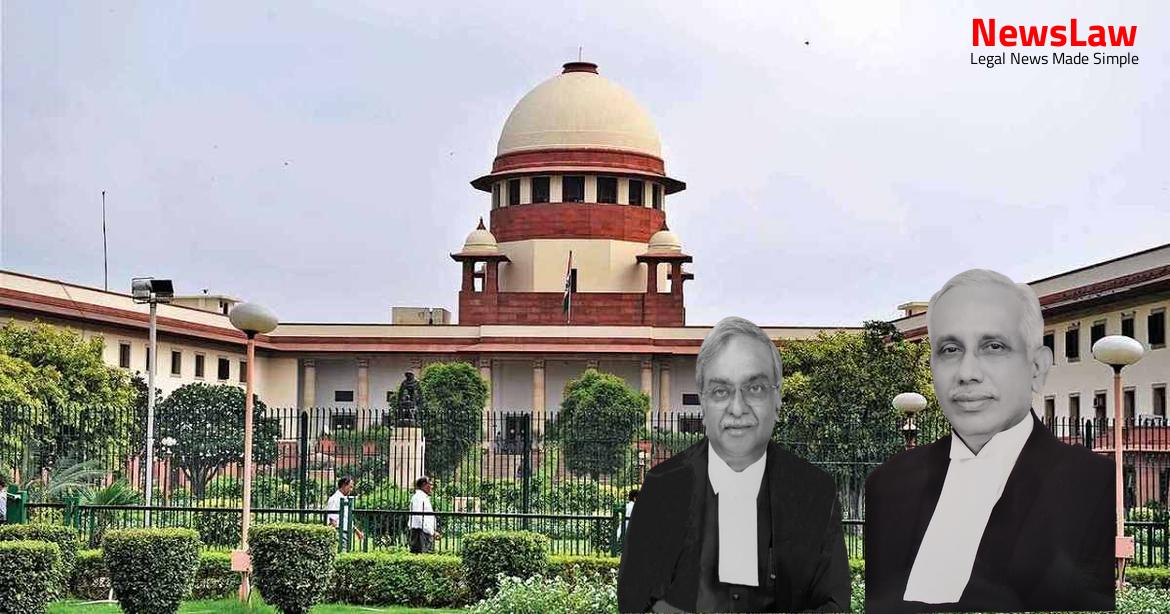The instant appeals have been preferred at the instance of State of Tamil Nadu assailing the impugned judgment and order passed by the Division Bench of the High Court dated 19 August, 2014 affirming order of the learned Single Judge dated 23 January, 2012 in its jurisdiction under Article 226 of the Constitution directing the State Government to create the posts under the designation “Village Level Workers” which is called as “Makkal Nala Paniyalargal” (hereinafter being referred to as “MNP”) or by any other name but shall accommodate the persons who were on the rolls of MNP on the date of issuance of G.O.M No 86 dated 8 November, 2011 against any vacant post in the State Government schools, village Panchayats, town Panchayats, Municipalities, Corporations, Collector Office, village offices or any other Government offices and undertakings of the Government of Tamil Nadu throughout the State of Tamil Nadu, according to the qualification possessed by each candidate, without reference to age in their native, taluk or revenue District. Thus, a total of 25,234 workers were to be engaged throughout the State on a monthly honorarium of Rs.200/- and it entrusted separate responsibilities to male and female workers. Later, the scheme was disbanded by the Government by order dated 13 July, 1991 on the premise that the appointments made of MNP are in no way helpful for the execution of programmes at village level except causing additional expenditure of Rs.6 crores per annum to the Government and left the execution of various developmental activities concerned through extension officers at block level. The policy decision of the Government which was earlier introduced by Order dated 2 September, 1989 for all practical purposes and later restored by the Government vide order dated 24 February, 1997 was again disbanded with immediate effect by order dated 1 June, 2001.
It has come on record that in the interregnum period, approximately 600 MNPs were absorbed in the State of Tamil Nadu in various village panchayats as Office Assistants/Night watchman. The learned Single Judge of the High Court allowed the writ petition by a common order dated 23 January, 2012 and while quashing the order dated 8 November, 2011 directed the State of Tamil Nadu to reinstate the members of the associations who have served as MNP. (ii) If the same is not possible on any account, the State Government shall accommodate the persons who were on the rolls of MNP on the date of issuance of G.O.Ms No 86 dated 8.11.2011 in any one of the vacant post in Government schools, village Panchayats, town Panchayats, Municipalities, Corporations, Village Offices, Taluk Offices and Collector Offices and in various other Government Offices and Undertakings of the Government of Tamil Nadu throughout the State of Tamil Nadu, or in any post as may be created for implementing the new schemes introduced in 2014-2015 Budget and accommodate the MNP, according to the qualification possessed by each candidate, without reference to age in their native Taluk or Revenue District.
At the same time, the finding recorded by the learned Single Judge that the action of the State Government was per se mala fide in passing the order dated 8 November, 2011 as directed in Para 33 was held to be unjustified and that became the subject matter of challenge in appeals before this Court. It is informed to this Court that majority of the persons who were discontinued pursuant to the order dated 8 November, 2011 and who otherwise fulfil the conditions of eligibility have joined under the scheme introduced by the Government dated 7 June, 2022. Learned counsel submits that creation and abolition of posts rests with the Government and is a matter of Government policy, which can always be exercised in the interest and necessity of internal administration and the Court would be the least competent in the face of scanty material to decide whether the Government acted bonafidely in creating a post or refusing to create a post or its decision suffers from malice (legal or factual) and as long as the decision to abolish the post is taken in good faith, interference by the Court was not warranted.
Thus, no right could have been conferred/vested in favour of the individual and that apart, the Government has reviewed the whole scheme by introducing employment scheme for rural educated mass, to meet the appointments earlier made and since they are discontinued by order dated 8 November, 2011, the present Government voluntarily came out with the scheme dated 7 June, 2022 to consider such of the unemployed youth who had discontinued to work in the village panchayat as MNP, for almost a decade by that time, be given priority and may be engaged under the Central Government scheme, which was framed under the Mahatma Gandhi National Rural Employment Guarantee Act, 2005(hereinafter being referred to as the “Act 2005”) on an honorarium of Rs. Learned counsel submits that majority of them have received their wages by this time but the miniscule of persons who are contesting today, either have not encashed or have repaid the money back to the Government and submits that those who are left out and have not joined so far under the present scheme introduced by the Government dated 7 June, 2022, although as per timelines introduced, no fresh engagement can be made but earlier this Court permitted the persons who were disengaged to join and become member of the scheme, still the Government has kept it open and the persons who would like to join, they are always at liberty to re- join in terms of the scheme introduced dated 7 June, 2022 and those who are not inclined, can always accept their 6 months’ wages for the period from 1 December, 2011 to 31 May, 2012 at any point of time from the Office of the District Collector if they have not already received so far. Per contra, learned counsel for the respondents, while supporting the finding returned by the High Court under the impugned judgment submits that their fate of appointment has always been dependent upon elected Government in power. The consistent policy which has come on record is in itself an indicator to show that as and when decision was taken to abandon or abolish the scheme, it was only for political reasons and not based on any substantial or valid reason on record. This Court always comes forward to regularize such employees who had worked uninterruptedly for sufficient long time and that can be traced out from the judgment of this Court in the case of Secretary, State of Karnataka and Others Vs.
Learned counsel further submits that during the interregnum period between June, 2009 and November, 2011 until the order impugned came to be passed, the Government earlier came up with a scheme that such of the employees who are serving as MNPs may be absorbed into a regular post of Record Clerk/Office Assistant/ Night watchman or any other equal cadre post against 50% of regular vacancies and by an order dated 1 June, 2009 approximately 600 MNPs were absorbed on various posts and since this has been discontinued/disbanded by successive Government by order dated 8 November, 2011, the respondents who were in queue and waiting for their absorption were deprived of their legitimate right of fair consideration and no reason was assigned by the Government while passing the order dated 8 November, 2011 and merely because there was a change of guards, that in itself would not be a ground to abandon the scheme which was in vogue for a long time.
But the fact is that the employees became its victim and that appears to be the reason for which the impugned order dated 8 November, 2011 came to be passed and after they have been contesting their rights for almost more than a decade, at least, this Court in the interest of justice, may not interfere, in the peculiar facts and circumstances of the case. If we look into the scheme originally introduced by the Government by Order dated 2 September, 1989, the object of the scheme was to provide employment to the educated youth in rural areas who have completed 10 standard in implementing several programmes of the Government at the village level which require continuous effort for successful completion.
This can very well be noticed from the records that the Scheme which was introduced by the Government for providing employment to educated unemployed youth in rural areas dated 2 September, 1989 came to be disbanded by the successive Government by order dated 13 July, 1991 in consequence discontinued the service rendered by such unemployed youth. Later, it was again introduced by order dated 12 June, 2006 and their honorarium stood increased at later stages and their services stood extended by order 21 May, 2010 for the period from 1 June, 2010 to 31 May, 2012. (ii)
The State Government shall, in such rural areas in the State and for such period as may be notified by the Central Government, provide to every poor household guaranteed wage employment in unskilled manual work at least for a period of one hundred days in a financial year in accordance with the provisions made in the legislation.
(vi) A Central Employment Guarantee Council at the Central level and State Employment Guarantee Councils at the State level in all States where the legislation is made applicable will be constituted for review, monitoring and effective implementation of the legislation in their respective areas. (x) Provisions for Minimum features of Rural Employment Guarantee Scheme and conditions for guaranteed Rural Employment under a scheme and minimum entitlements of labourers have been laid.
Section 3 refers to guarantee of rural employment to households, the State Government has to provide to every household whose adult members volunteer to do unskilled manual work not less than one hundred days of such work in a financial year. Chapter IV notifies implementing and monitoring authorities at the central level by Central Employment Guarantee Council and at the State level, by State Employment Guarantee Council as referred to under Sections 10 and 12 of the Act, 2005. After the Act, 2005 came into force, such States which are notified in the Schedule as referred to under Section 1(3) of the Act, 2005 which includes the State of Tamil Nadu, the same was offered to the educated unemployed youth primarily under the Act, 2005.
At the same time, while the policy decision of the Government is always open to judicial review on the anvil of Article 14 of the Constitution and is ordinarily not to be interfered unless that is attached with legal or factual malice of the Government, however, in the instant case, the Division Bench of the High Court has set aside the finding so far as the malice which was imputed by the learned Single Judge in passing order dated 8 November, 2011 is concerned. Learned Single Judge and Division Bench in their impugned judgments have concurred with the finding that such of the employees who were discontinued by passing of the order dated 8 November, 2011 are not only entitled to reinstatement but deserve to be regularised in service after creation of post. Creation and sanction of posts is a prerogative of the executive or legislative authorities and the court cannot arrogate to itself this purely executive or legislative function, and direct creation of posts in any organisation. It is also true that the status of permanency cannot be granted by the Court where no such posts exist and that executive 2008(1) SCC 683 2009(8)
Also Read: https://newslaw.in/case-type/civil/judgment-on-execution-of-lease-deed-for-remaining-land/
SCC 556 functions and powers with regard to the creation of posts cannot be arrogated by the courts.” The respondents were not in employment of the Government or holding a civil post and also not appointed against the cadre post in any of the Government establishment where the service conditions are governed/regulated by the statutory rules framed under the proviso to Article 309 of the Constitution. But as already observed, such employees are not entitled for reinstatement and for regularization of service for the reason that if the order passed on 8 November, 2011 is not sustainable, the respondents and other similarly situated persons engaged could be restored on the same terms as they were placed before passing of the order dated 8 November, 2011. This Court deprecated such practice but as one time measure permitted the Government to regularize such employees who are working against the sanctioned post and permitted by the government without intervention of the Court as referred to under Para 53 of the judgment. In that context, the Union of India, the State Governments and their instrumentalities should take steps to regularise as a one-time measure, the services of such irregularly appointed, who have worked for ten years or more in duly sanctioned posts but not under cover of orders of the courts or of tribunals and should further ensure that regular recruitments are undertaken to fill those vacant posts that require to be filled up, in cases where temporary employees or daily wagers are being now employed.
Case Title: GOVT. OF TAMIL NADU AND ANR ETC ETC Vs. TAMIL NADU MAKKAL NALA PANIYALARGAL AND ORS ETC ETC (2023 INSC 350)
Case Number: C.A. No.-010563-010569 / 2017



